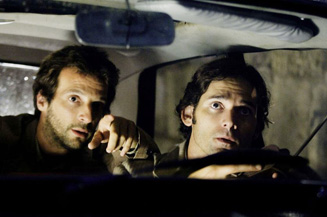Movie vs. Reality: Munich
By Felix Quinonez
April 4, 2012
As you can see, Spielberg took some liberties with Munich. Some are minor and others are more noticeable. But the movie is very clear that this is not a documentary and it should be treated as what it is; a Hollywood movie. Some of the omissions are clearly just done for time’s sake. If he included everything, the movie - which already lasts more than two and a half hours - would be way too long. I’m guessing that is the reason why he didn’t include the air raids on the Palestinian refugee camps that took place after the Munich Olympics. This could also explain why all of the agents who were involved for surveillance during the missions weren’t included. That would just give the movie more stuff that it would have to explain and more characters to introduce.
Another explanation for these changes could be just that not all of the facts are available. Because of this, Spielberg and his writers had to come up with their own way to portray these scenarios.
It should be clear to most people that the events in Munich are very complicated. There has been tension and fighting between the Palestinians and the Israelis long before the Olympics. Because of this Spielberg didn’t want to reduce the story to “the Palestinians are bad and Israel is just getting revenge.” That would be a black and white representation of the situation. Because of this Spielberg tried to give a representation of the Palestinian side too. He did this through the fictional PLO team leader and through the fiery speech he gives to Avner in the Athens safe house scene.
But like I said before, the thing that people have taken the most issue with is the fact that the Israeli team had doubts about their missions. Some people think this paints Israel in too much of a favorable light, saying that it allows them to kill people but in the end they feel bad about it. Others feel the opposite. They take issue with the team having doubts because they think this blurs the line between the Palestinians’ actions and Israel’s response when there should be no confusion about the difference between the two. But the simple fact that people can have the exact opposite reaction to the same movie might imply that too many people are bringing their own biases and political agendas when viewing the film.
Jonas, who referred to Munich as “moral posturing” stated that “one doesn't reach the moral high ground by being neutral between good and evil.” But I think that stance misses the point of the movie. Is it Spielberg’s place to tell us who is right or wrong? Should anyone really expect him to solve the problems of the world? I think Spielberg was trying to raise questions and make people talk about this situation. Because talking about it is the first step to finding a solution.
And the movie does just that. It brings up the question of what killing can do to a man’s soul. Is it okay for someone to do bad things for a good cause? Does a response to a response really solve anything? Or does it just create - as Spielberg put it - “a perpetual-motion machine”? These are very bold questions and judging by the film’s closing shot of the then still standing twin towers, they are questions that still need to be asked.
Next Time: 127 Hours
Continued:
1
2
3
4
5
6
7




